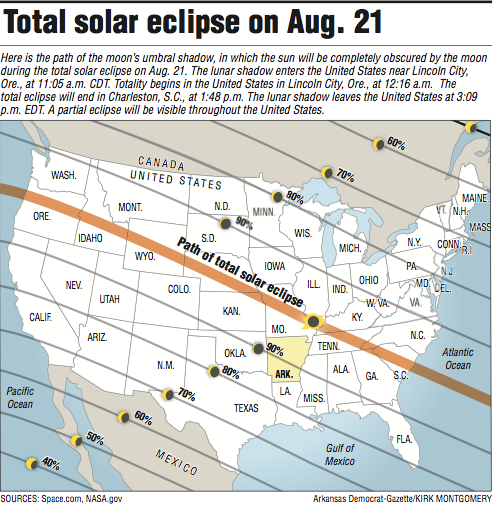The first coast-to-coast total solar eclipse in 99 years will occur in the United States on Aug. 21, and although Arkansas isn't in the "path of totality," residents will see the darkening of the sky, the lowering of temperatures and the disruption of wildlife associated with the astronomical phenomenon.
"It's exhilarating to see," Carl Freyaldenhoven, a member of the Central Arkansas Astronomical Society, said of the eclipse. "It's something to put on your bucket list."
The total eclipse will darken a 70-mile-wide band on its path from Oregon to South Carolina. The rest of the country will experience a partial solar eclipse. Depending on their locations, Arkansans will see at least 83 percent of the sun obscured by the moon. Corning and Piggott, in Clay County in the northeast corner of the state, will see the darkest skies when the moon blocks 97 percent of the sun.
In Little Rock, when the eclipse reaches its maximum coverage at 1:18 p.m., 89 percent of the sun will be covered.
"It's a goose-pimple experience," said Bruce McMath, past president of the Central Arkansas Astronomical Society. "The temperatures will drop 10 degrees. Animals will act up. It'll be nighttime dark, and you will be able to see stars and planets.
"It's a dramatic experience."
Solar eclipses are rare. The moon and sun line up every 29 days, but because the moon follows a tilted orbit around the earth, it is seldom seen blocking the sun.
There is also an astronomical coincidence that allows the events. The moon's diameter is 400 times smaller than the sun's diameter, and the sun is 400 times farther from Earth than is the moon. On Earth, the two orbs appear to be the same size and on the infrequent occasions when they meet, eclipses happen.
While scientists have plotted the celestial paths for centuries, some cultures believed eclipses occurred for other reasons.
The Pomos, an indigenous group in the northwestern United States, once thought solar eclipses happened when a bear fought with the sun. The bear took a large bite of the sun, causing the eclipse, and then they resolved their differences. Norse legend said a ravenous wolf ate the sun, and ancient Vietnamese culture believed a hungry frog feasted on it.
And eclipses have played a part in history. In 585 B.C., a solar eclipse ended a seven-year war between the Lydians and Medes in Greece. Battlers saw the darkening of the skies as a sign to make peace.
French scientist Jules Janssen discovered helium on Aug. 16, 1868, just as a solar eclipse occurred. He named the element after "helios," which is the Greek word for "sun."
Freyaldenhoven said this year's eclipse is the first to occur during the peak of social media.
"It will only take 94 minutes to cross the U.S., but you'll see it on social media immediately," he said of the eclipse. "People will see pictures on their phones and computers instantly."
Looking directly at the sun or a solar eclipse can damage the eyes.
He urged viewers not to look directly at it, but to instead either use arc welder glasses or make pinhole cameras. He also suggested punching a hole in an envelope and putting a small makeup mirror inside the envelope. By aiming the envelope, a viewer can project the reflection of the sun onto a wall.
Meteorologist Charles Daulton of the National Weather Service in North Little Rock said Aug. 21 is too far ahead to accurately predict what the weather will be that day, but because it is the warmest time of the year in the state, it's likely the sky will be clear and viewing opportunities should be optimum.
"Even on a warm summer day, there could be some clouds bubbling up, but it favors having a better chance of clear skies," he said.
Daulton said he intends to travel either to his home state of South Carolina or to Nebraska to see the eclipse.
"I've been waiting to see this for 15 years," he said.
He will wait until a week or so before the event to decide where to view it.
"It depends upon what the weather looks like," he said.
State Desk on 07/03/2017

